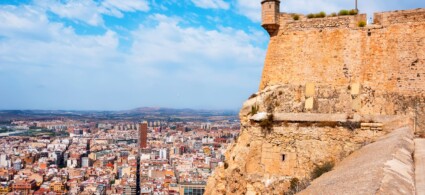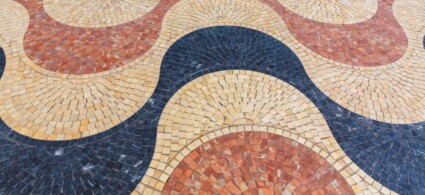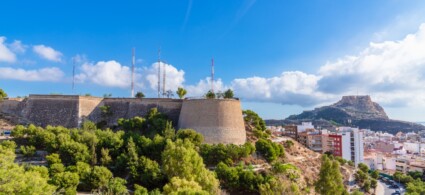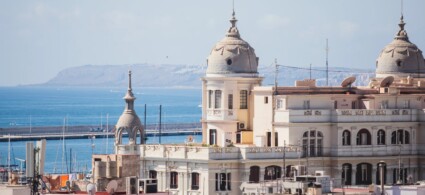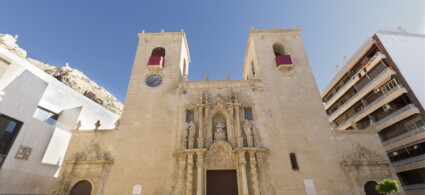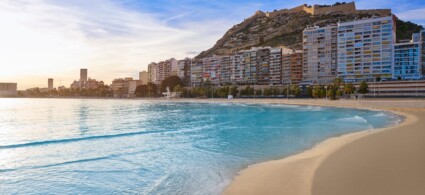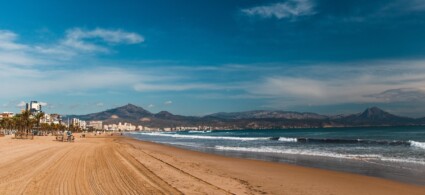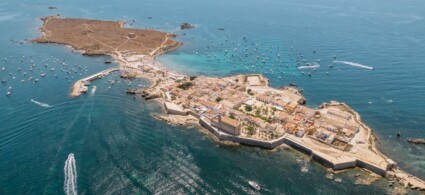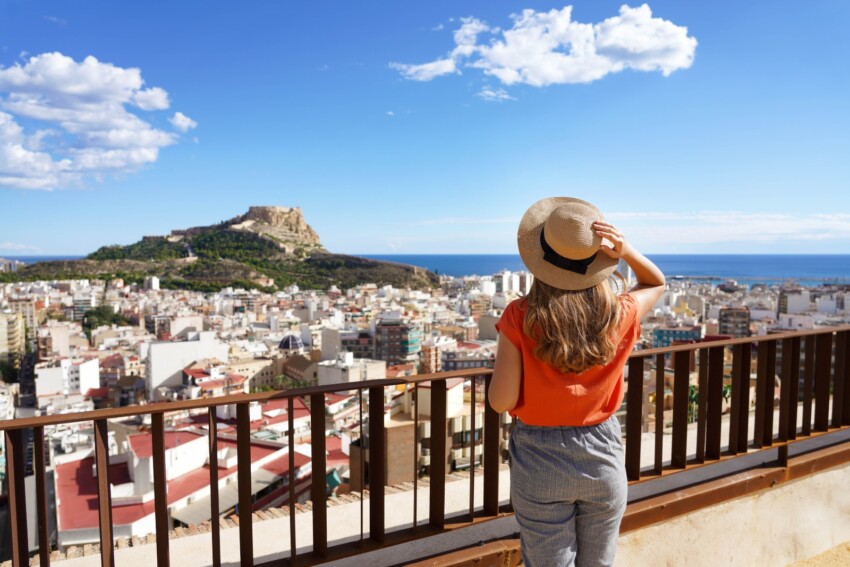

Between a tapas and a cerveza, a dip in the sea and a walk in the shade of the palm trees, relaxation is guaranteed in Alicante. But if you want a more active holiday to get to know the city better, here is a list of what to see in Alicante.
The great attraction of Alicante is of course its beautiful beaches, characterised by fine sand and azure blue waters.
The city’s beaches are well-equipped and equipped with numerous facilities, making them suitable for a varied public, including families, young people, sports enthusiasts and the elderly. Start your exploration of the Alicante coastline from the Playa del Postiguet, the city beach par excellence and then move on to one or more of the surrounding beaches.
Not only sea in Alicante, but also culture and history. Admire the city from the top of the Santa Barbara Castle, a fortress perched on a 166-metre rocky promontory overlooking the sea, then visit the city’s jewels of religious architecture: the Basilica of Santa Maria and the Co-Cathedral of San Nicholas of Bari.
Relax strolling through the narrow streets of the old town or along the famous Explanada de España, a pedestrian boulevard embellished with six and a half million marble tiles. You can also return here in the evening for a drink or some music.
A word of advice: take some time to also visit the places around Alicante. Pink salt pans, marine reserves, record-breaking palm groves and ancient villages are just some of the scenic and architectural wonders that await you in the Alicante region.
In a city that offers so much, aim for the best: here are the must-see attractions in Alicante.
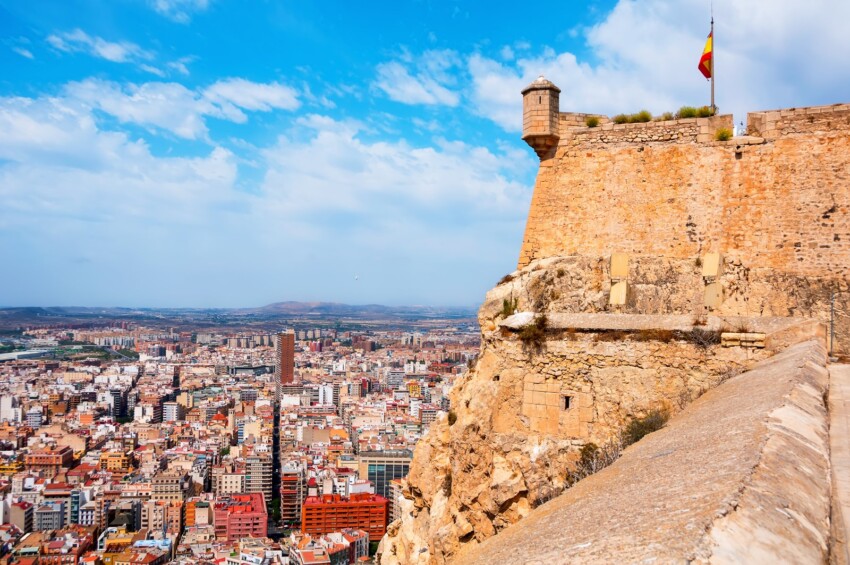
The symbol of Alicante and its main tourist landmark is the Santa Barbara Castle, built on the Benacantil hill overlooking the sea. Dating back to the 9th century, when the Iberian Peninsula was in Muslim hands, the castle has been remodelled several times throughout its history and was opened to the public as a tourist site in the mid-1960s.
When you visit the castle, you can admire the ruins of one of the most important and strategic strongholds in the Mediterranean, and at the same time enjoy a beautiful panorama of Alicante and its coastline. You can walk along the walls, admire the remains of an ancient church and also some much more recent sculptures.
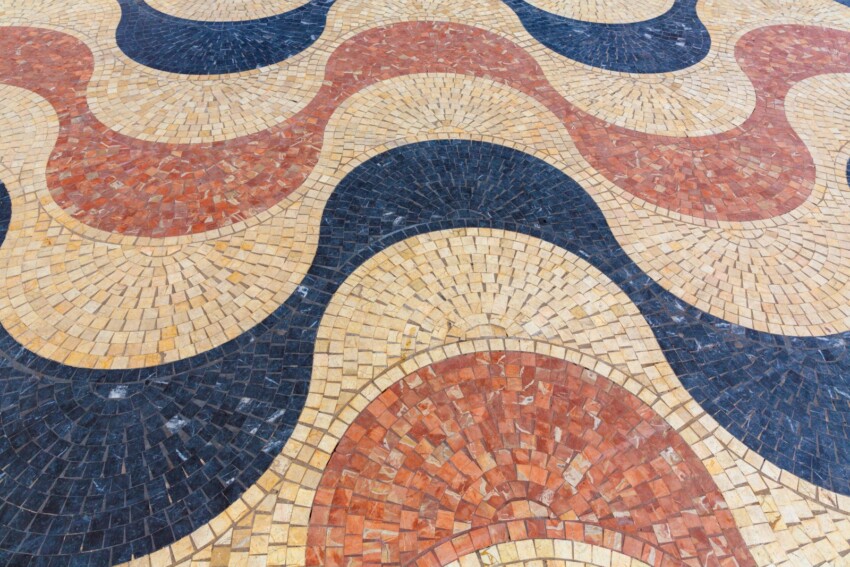
Alicante’s promenade is called Explanada de España. It is a pedestrian promenade lined with palm trees, paved with more than 6 million marble tiles arranged to create waves of different colours. The Explanada stretches from the port of Alicante to the Gran Via, ending at the famous statue of Mark Hersch.
Needless to say, walking up and down the Explanada de España is a favourite pastime of Alicantinos and tourists alike. It is a favourite meeting place for young people and couples, the perfect location for open-air summer concerts and for watching the boats and yachts moored at the harbour. However, as a promenade it is unusual, precisely because it faces the harbour and not the beach. If you want to walk alongside the beach, do so at Paseo de Gomiz, opposite Playa del Postiguet.
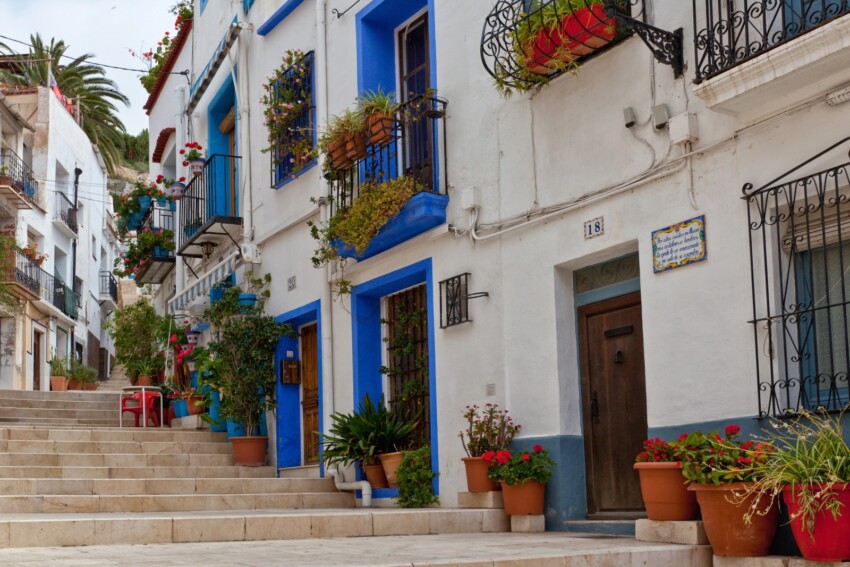
In the collective imagination, Spanish cities are made up of low, white houses, all adorned with flowers, wrought-iron balconies, ceramic tile details and elegant decorations. Then you arrive in the centre of Alicante and find none of this. If disappointment is just around the corner, chase it away by heading up to Barrio de Santa Cruz, the city’s historic area.
Perched on a hillside of the Benacantil hill, on top of which stands the Santa Barbara Castle, the Barrio de Santa Cruz is made up of narrow pedestrian streets, stairways and small squares that suddenly open up, from whose miradores you can get a beautiful view of Alicante and the sea. In recent years, the Barrio de Santa Cruz has also become a place for Alicante nightlife, thanks to the emergence of numerous cocktail bars and tapas bars where tourists like to stay late and have fun.
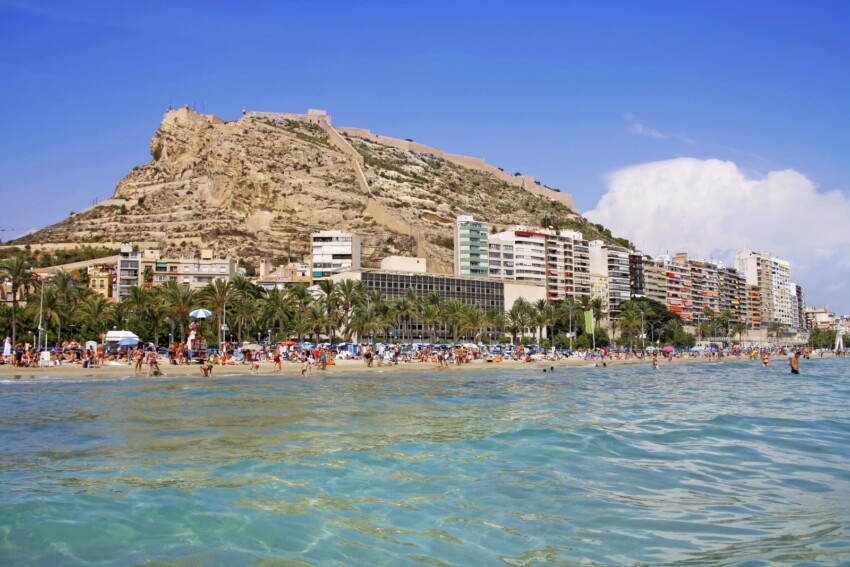
Alicante’s beach par excellence is Playa del Postiguet. It is located practically in the city centre, a stone’s throw from the Explanada de España, the Basilica of Santa Maria and the Barrio de Santa Cruz. It is not the only beach in the city, but it is undoubtedly the most convenient to reach from the centre, and therefore the most frequented by locals and tourists.
Playa del Postiguet is a soft, golden sandy beach with all facilities. It is partly free, while in some areas it is equipped with sunbeds and umbrellas for hire. There is also a thin area of shade provided by a few palm trees. Immediately behind the beach is the pedestrian promenade Paseo De Gomiz, overlooked by some cafes and services such as public toilets and an emergency medical station. There is also parking, although this is largely insufficient in summer.
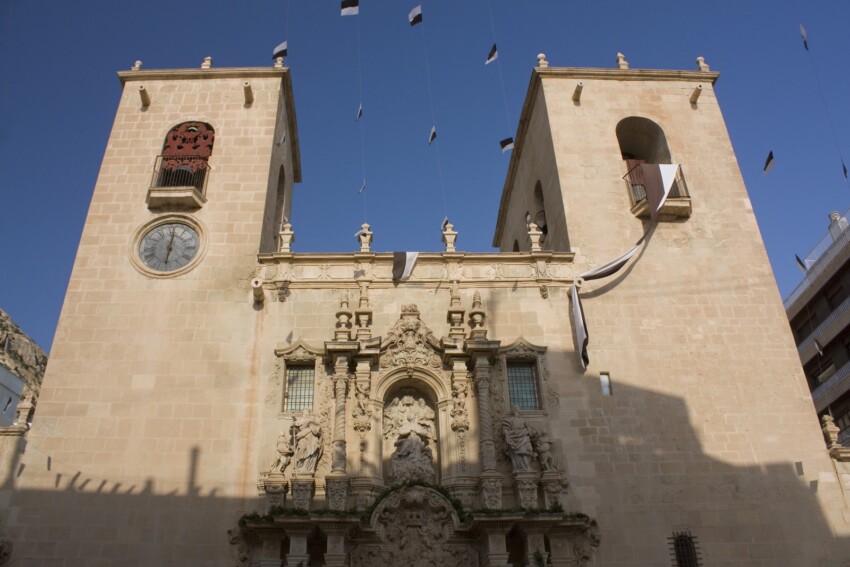
Very close to the Playa del Postiguet stands the 16th century Basilica of Santa Maria. It was built on the remains of an old mosque in Valencian Gothic style, with a richly decorated Baroque entrance. Today it is the oldest surviving church in Alicante, and inside it consists of a single nave with six side chapels. The façade, on the other hand, is unique, with two asymmetrical towers and a beautiful statue of the Virgin Mary on the doorway, the work of Juan Bautista Borja.
In 2007, the municipality of Alicante made an official request to the Vatican to elevate the church to the status of basilica. The request was accepted shortly afterwards.
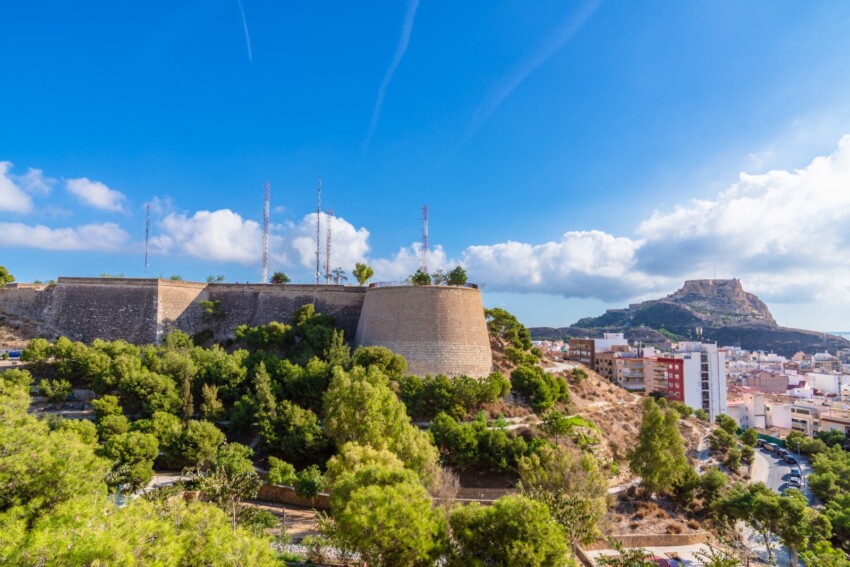
Located on the edge of the centre of Alicante, on the Tossal hill that rises about 100 metres in height, is the castle of San Fernando, for many the younger brother of the more famous Santa Barbara Castle. It is actually much less visited, but if you have the chance, give it a look and you will not regret it.
Unlike Santa Barbara Castle, the history of San Fernando Castle is much more recent. It dates ‘only’ from the 19th century, when it was built to reinforce Alicante’s defensive system during the War of Independence. The castle, with an irregular layout, is formed by a main bastion to the north and a round bastion to the south-west. The two parts are connected by a network of walkways.
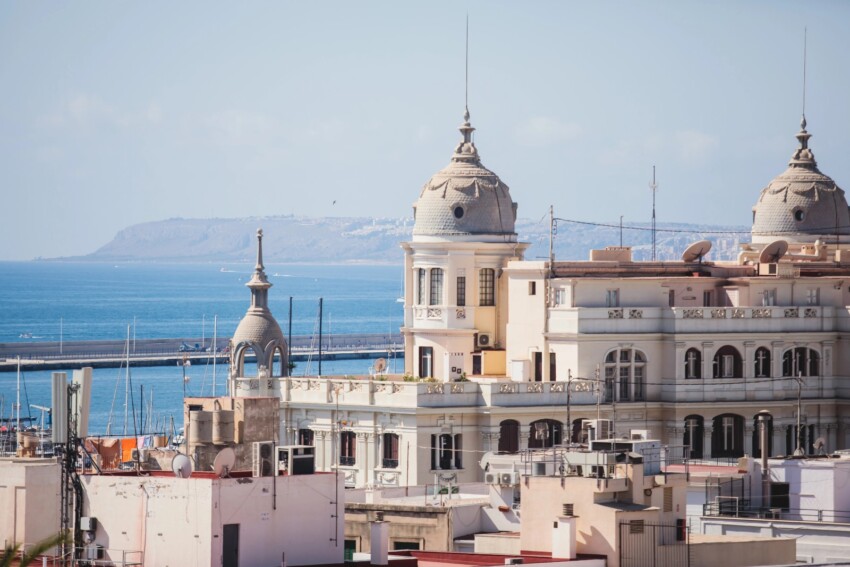
This interesting church in Alicante is located in the city centre and is one of the easiest landmarks to identify thanks to its blue tiled domes. Domes that, unfortunately, are hardly noticeable from below, but if you have a chance to go up to the castles of Santa Barbara or San Fernando you will be able to identify and recognise this interesting church in less than a second.
If the façade of the Co-Cathedral of St. Nicholas of Bari is spartan and of little interest, the same cannot be said of the interior. It is very beautiful and elegant and conserves some notable works of sacred art, such as the Retablo of St. Nicholas, a gilded and polychromed wooden altarpiece, the Retablo of Our Lord, which is the oldest Baroque retable in the province of Alicante, and the Chapel of Communion, dating from the 18th century, one of the best examples of late Spanish Baroque.
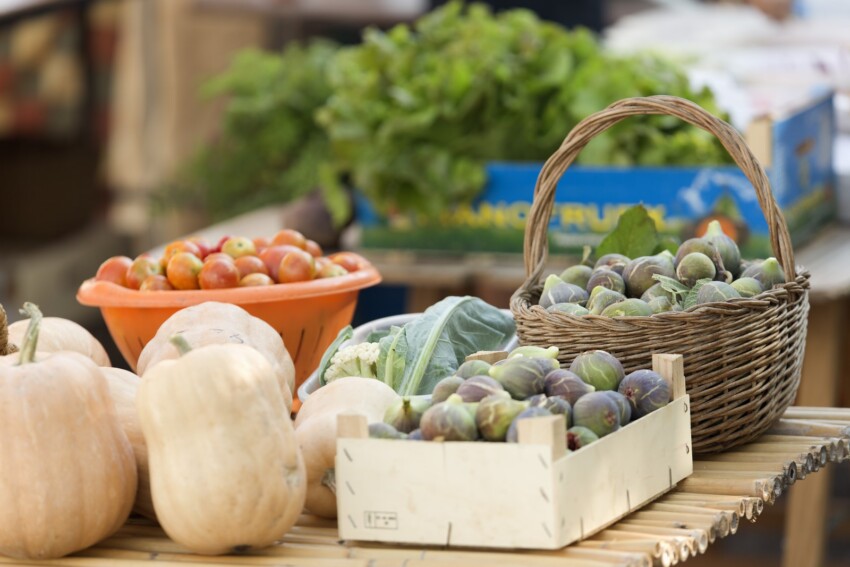
Along Avenida Alfonso El Sablo, which marks the northern edge of Alicante city centre, is the elegant Mercado Central building. Inside, you can wander among the stalls and admire the Spanish culinary art at first hand: you will find cheese, seafood, baked goods, cheeses, meats, fruit and vegetables for sale, and of course you can buy many products to take home as souvenirs.
Don’t miss lunch or breakfast at the Mercado Central: the abundance of stalls and stands where you can get something to eat is disarming, you’ll want to try everything, try it to believe! But beware of opening hours: Alicante’s central market is closed on Sundays, while on the other days of the week it opens from 7 am to 2.30 pm.
The Museo de Arte Contemporáneo de Alicante, referred to by its acronym MACA, is a municipal museum created in 1976 and totally renovated in 2011. Today, it exhibits three permanent collections, which bring together a total of around 800 works of art. Incidentally, the building that houses it is also a work of art in itself: it is in fact the oldest civil building in the city.
Of the MACA’s three permanent collections, the first is dedicated to the 20th century, with works by Joan Miró, Pablo Picasso, Salvador Dali and many others on display. The second is dedicated to Juana Francès, an Alicante artist who lived in the 20th century, while the third is dedicated to the artist Eusebio Sempere, the museum’s creator.
Discover Alicante through the eyes of expert guides who will take you on a tour of the city's hidden treasures. Participating in a free tour will allow you to capture the true essence of Alicante.
The free tours are a viable alternative to traditional guided tours. They work like this: participation is free and at the end of the visit you can leave a tip at your discretion. Below you will find our favourite free tour, otherwise you can see the full list by visiting this page.
In the following map you can see the location of the main places of interest mentioned in this article.
Take some time during your holiday in Alicante to visit the surrounding area. The Alicante region is rich in scenic and cultural treasures and, of course, offers countless opportunities for entertainment.
The nightlife capital is definitely Benidorm, known as the New York of the Mediterranean or the Spanish Rimini, where you can experience long nights of music, drinks and new encounters. During the day, this temple of fun welcomes people of all ages who relax, play or do sports on the city’s beaches.
An interesting place for food and wine lovers is Dénia, the city of the red shrimp, which is celebrated every year with a prestigious international cooking competition. If you love nature, lose yourself in the palm grove of Elche, the largest in Europe, or try the exciting experience of bathing in a pink salt lake in Torrevieja.
Also worth a stop is Villajoyosa, or ‘the joyful city’ (could it be because of the presence of important chocolate factories?), very pretty with its typical colourful little houses. Take home a spectacular photograph by stopping in Calpe, with its bay dominated by the imposing Ifach Peak.
Want something unique and not so touristy? Spend a night on the island of Tabarca.
Some places can be reached by public transport, but the best way to explore the region is to rent a car. Stop at all the places that intrigue you, staying as long as you like. Go at your own pace, without anyone rushing you!
Find out before you leave if there is a traditional festival taking place at that time: they are very heartfelt and truly impressive, don’t miss them!
